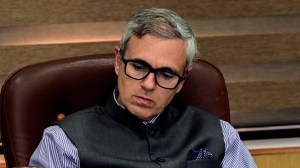Alexander steps in to end rift over Appropriation Bill
MUMBAI, AUG 3: The week-long impasse over passage of Appropriation Bill was resolved today following successful intervention of Governor P...

MUMBAI, AUG 3: The week-long impasse over passage of Appropriation Bill was resolved today following successful intervention of Governor P C Alexander.
After hearing arguments advanced by Shiv Sena leader Pramod Navalkar and Bharatiya Janata Party’s Ashok Modak, Alexander personally asked Chief Minister Vilasrao Deshmukh to introduce Appropriation Bill in Upper House and ensure that it was passed.
“Alexander made it clear that if a money bill passed by Lower House is not introduced in Upper House, then it will amount to breach of Constitutional provisions. Following Alexander’s advice, the Congress-led Democratic Front Government issued a corrigendum to provide for introduction of bill in today’s agenda,” a senior official told The Indian Express.
Alexander brought to notice of Chief Minister that it was mandatory for ruling party to ensure that the bill, which has been passed by Lower House, must be introduced in Upper House. “If for political reasons or otherwise also, a bill passed by Lower House is not introduced in Upper House, then it will be against spirit of democracy as well as Constitution,” the official added.
Navalkar and Modak brought to notice of Alexander the provisions of article 198 of Constitution. The article inter-alia states that after a money bill is passed by Lower House, it shall be transmitted to Upper House for its recommendations and return the bill with its recommendations within a period of 14 days to the assembly.
Navalkar told Alexander that since the assembly has already been prorogued, there was no question of returning the bill to Lower House. Under such circumstances, wherein money bill has not been passed by Lower House, it will create a constitutional problem before the state, since it will not be able to utilise Rs 2078 crore mentioned in the appropriation bill.
Following submissions made by Navalkar and Modak, who apparently took the view that there was urgent need to intervene to avoid confrontation between ruling party and the opposition, particularly over passage of money bill. “Alexander took an overview of the situation and came to conclusion that introduction and passage of bill was essential. Non-introduction of money bill will amount to breach of constitutional provisions. Therefore, he personally spoke to Chief Minister and explained to him need to consider the introduction of the bill with a political mind,” the official added.
Subsequently, the bill was passed in the council after Chairman N S Pharande rejected the amendments proposed by the opposition, Sena-BJP.
The opposition, which enjoys a majority in Upper House, had sought to move seven amendments to the bill, suggesting a cut or addition to financial provisions in bill. However, amendments were turned down by Chairman."The amendments were in violation of provisions of article 204 of Constitutions and hence not admitted by the chair," Minister for Legislative Affairs Rohidas Patil said.
Prakash Javdekar (BJP) said the opposition was ready to pass money bill as government has reached an understanding with it. He said the opposition wanted to discuss bill in House and hence it was stressing on tabling same in Council. Accusing government of political vindictiveness, he said the opposition had decided to follow traditions of democracy and not to make any recommendations to the bill. Finance Minister Jayant Patil denied that government was seeking political revenge and sought co-operation of members to approve bill, which was later passed unanimously with a voice vote.
Deputy chairman Vasant Dawkhare announced that the bill was being sent back to Assembly without any recommendations.







- 01
- 02
- 03
- 04
- 05
























